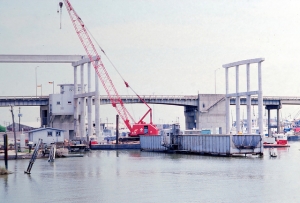

Photo by Patrick Feller is licensed under CC BY 2.0
The Highway Trust Fund, set to expire at the end of May, has motivated people throughout the country to reach out to members of Congress. The buzz in the media has been extensive and passion is rampant. Hundreds of people have been working Congress – many for months and even years. Regional coalitions, associations, elected officials, industry executives and taxpayers have all been to Capitol Hill to advocate for funding a long-term infrastructure funding bill.
The House of Representatives Tuesday voted on a two-month funding extension that will fund the Highway Trust fund through the end of July. The bill now goes to the Senate.
Although that was not the outcome hoped for, after that vote, the House introduced the long-term surface transportation bill – The GROW AMERICA Act supported both by the Administration and the U.S. Department of Transportation – that would provide six years of funding for all modes of surface transportation. Still, there is no assurance it will happen.
Without a long-term bill, regional leaders will continue to let critically-needed projects languish because there is no guarantee of long-term funding assistance. That’s a very bad result and it impacts the country’s competitiveness globally.
One has to wonder why this continues to happen. The United States ranks fourteenth in the World Economic Forum’s infrastructure index and some have called that a national scandal. Both Luxembourg and Canada rank above the United States. Infrastructure is vital to economic growth because there is no part of the country’s economy that it does not touch.
Since 2005, Congress has authorized 32 temporary extensions – ignoring the need to pass a long-term transportation funding bill. With the current eight-month extension coming to an end on May 31, the Government Accountability Office (GAO) has gone on record saying these temporary extensions impede long-term planning and implementation of critical projects that are needed to maintain the nation’s infrastructure. That’s a fairly bold statement for the GAO.
The American Society of Civil Engineers (ASCE) says the country needs $3.6 trillion of infrastructure investment by 2020. The U.S. Department of Transportation (DOT) lists 70,000 structurally deficient bridges and says that $43 billion is needed annually to modernize the country’s interstate highway system.
Ports are desperate for funding. Inland waterways move 51 million truckloads of goods every year, but half of the locks on American waterways are more than 50 years old. Replacement and maintenance is required. The nation’s airports need $34 billion for projects between now and 2020.
Why is Congress stalling while the picture becomes bleaker each year?
Several options have been offered to reform the effectiveness of the Highway Trust Fund. The creation of a National Infrastructure Bank to provide loans for all kinds of infrastructure projects has been suggested. At least some sort of financing options are needed. Options could include the elimination of state volume caps on private activity bonds, direct subsidy bonds and tax credit bonds. Any one or all of these options would free up capital for infrastructure projects.
Sen. Ron Wyden from Oregon introduced a “Move America” program that would also provide up to $180 billion of tax-exempt bonds over 10 years and $45 billion in new infrastructure tax credits to match private-equity investment. The program is designed to leverage additional private investment in our public infrastructure, but the bill is not moving. No one knows if it has a chance of passing!
Another option is public-private partnerships (P3s), but public officials in many states have been reluctant to launch P3s because of a lack of experience in structuring the contracts. America’s needs are great and the outcome is uncertain. If Congress balks again, there will be no option but to find other innovative funding options. The nation’s infrastructure cannot be ignored any longer.
Strategic Partnerships, Inc. will continue following the latest news regarding a long-term solution for transportation funding.
